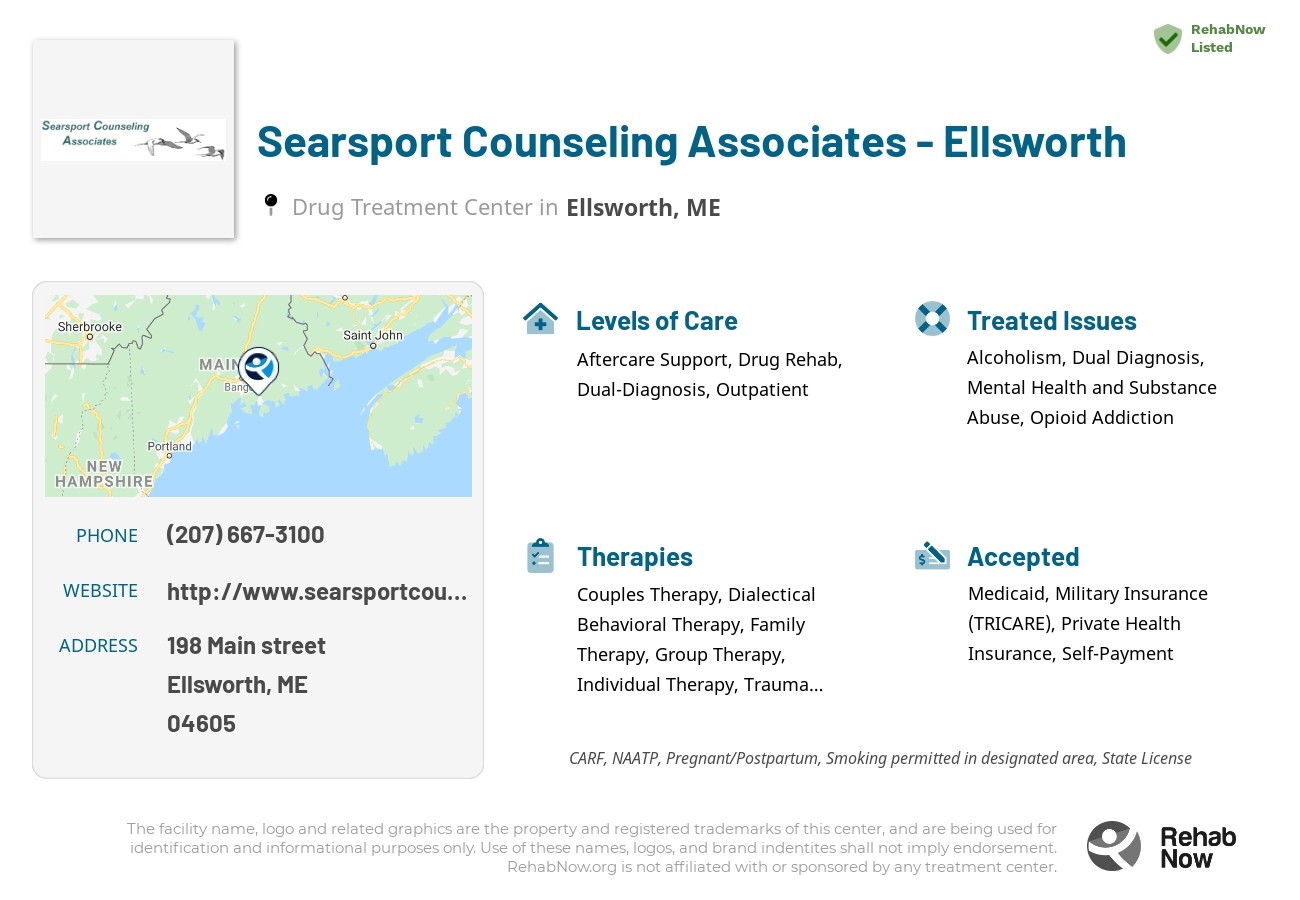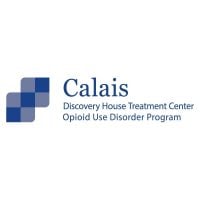Searsport Counseling Associates - Ellsworth
Drug Rehab Center in Ellsworth, Maine
Searsport Counseling Associates - Ellsworth is a mental health clinic in Ellsworth, Maine which specializes in treating Alcoholism, Dual Diagnosis, Opioid Addiction, and Drug Addiction, and offers a broad range of services and treatment types including couples therapy and financial assistance.
About Searsport Counseling Associates - Ellsworth in Maine
Searsport Counseling Associates - Ellsworth is a mental health clinic located in Ellsworth, Maine. They specialize in treating Alcoholism, Dual Diagnosis, Opioid Addiction, and Drug Addiction. The clinic offers a wide range of services and treatment types, including individual and family therapy, as well as aftercare and residential long-term treatments. Couples therapy, Dialectical Behavioral Therapy (DBT), Trauma Therapy, and Cognitive Behavioral Treatment (CBT) are also offered.
Searsport Counseling Associates - Ellsworth accepts private health insurance and provides financial assistance to those paying out of pocket. The facility strives to meet the needs of their clients and works tirelessly to ensure that each receives the right form of care and treatment. They understand the challenges of seeking help, and do their best to provide a non-judgmental, supportive environment.
Genders
Ages
Modality
Additional
Conditions and Issues Treated
Opioid addiction has become a significant health problem in the United States. In 2015, there were 91 opioid overdose-related deaths per day, with a substantial increase in mortality rate in 2014.
When opioid addiction has reached a point where a person’s life becomes unmanageable, treatment options are available to help them get sober. Treatment that includes medical care with medications and counseling can help a user transition into sobriety.
When someone in struggles with both addiction and mental or emotional illness, this is considered a dual diagnosis. Dual diagnosis treatment can include therapy for these issues to happen simultaneously, which will allow either of them to be treated effectively.
Sometimes people who have suffered from addiction disorder also suffer from co-occurring disorders such as depression, anxiety, bipolar disorder, etc., making them “dual diagnoses.” Dual diagnoses require specialized treatment programs where drug and alcohol addiction are addressed along with psychiatric illnesses. Some rehabilitation facilities provide patients suffering from cooccurrences a program with highly integrated services and a clean environment with few distractions to help them succeed.
Levels of Care Offered
This center offers a variety of custom treatment tailored to individual recovery. Currently available are Aftercare Support, Drug Rehab, Dual-Diagnosis, Outpatient, with additional therapies available as listed below.
Outpatient treatment is often used for drug addicts in drug rehab. Outpatient treatment consists of counseling and therapy sessions. This form of treatment is also called ‘day-treatment’. The outpatient treatment process begins with the addict’s initial detox period, lasting about ten days.
Outpatient treatment is used for those who are at moderate risk for ‘slipping back’ into the addiction, for those who:
- Are not currently experiencing any side effects from withdrawal and can handle social pressure
- Can handle stressors that might trigger relapse
- Have a stable living environment or have moved out of their previous environment, which was not conducive to being sober
- Have a support system that allows them to go to a facility a few times a week while still keeping their current responsibilities
- Have no legal obligations, being either on parole or probation, that require them to seek treatment at a mandatory facility
- Are not currently experiencing any side effects from withdrawal and can handle social pressure
- Have a stable living environment or have moved out of their previous environment, which was not conducive to being sober
Completing a drug or alcohol rehab program is only the first step. Then comes aftercare support. These services include sober living accommodations, career counseling, and AA/NA programs for those struggling with sobriety or who want help maintaining it after initial rehab at an addiction facility.
They can last up to a year or more depending on what’s needed most urgently after the earlier stages are completed.
Therapies & Programs
Because no single treatment is effective for all addicts, the goal of treatment and therapy should be to figure out what works best for each individual. Tolerance and withdrawal levels differ from person to person, affecting the treatment intensity required. Addiction treatment should aim to help addicts develop healthy coping mechanisms for dealing with their addiction and its underlying causes.
Couples therapy works with clients and significant others in a professional capacity to improve relationship dynamics. This can be helpful for addicts who are trying to marry the idea of recovery into their work, family, social lives – any aspect that has to do with relationships. Through counseling sessions, addicts will have an opportunity to talk about their addiction with professional partners.
Family therapy is beneficial for people who are in addiction treatment services because it offers addicts the opportunity to work with their family members to better understand what led them to make choices that contributed to their addiction.
This type of therapy helps family members reach a deeper understanding of how they can best support their loved one during recovery. It also helps the addict better understand their own motivations and triggers that led them to turn to substance abuse.
Family therapy can help addicts in the following ways:
- Assists family members in processing difficult feelings so they don’t blame or resent recovering addicts
- Assists family members in understanding how addiction has impacted the addict and everyone who is involved with them
- Allows the addict to take responsibility for their actions, while encouraging improved communication skills
- Helps family members understand how to best support an individual in recovery so addicts don’t relapse again.
Group therapy can help build a stronger support system and give addicts in Ellsworth, ME insight into their addiction that they gain through shared conversations. Group therapy occurs in a controlled group environment, exclusive of one on one meetings. This makes it safer for patients to feel comfortable sharing the struggles they’re going through and gaining perspective.
Trauma therapy is beneficial for people who are recovering from drug addiction because it helps them heal from past traumas that may have caused them to turn to harmful substances or led them to experience negative emotions that contributed to their destructive behaviors.
This type of treatment works by processing difficult experiences so individuals can learn how to process these events without having to turn to substances for coping.
Trauma therapy can help addicts in the following ways:
- Helps individuals understand their experiences and emotional responses to difficult events, including why they turned to drugs or alcohol
- Provides them with comfort and support while working through difficult emotions related to these traumatic experiences
- Offers an opportunity for addicts to have a voice and be heard, which can improve their self-esteem
- Can help them develop coping skills so they can better respond to triggers instead of turning to substance abuse.
Dialectical Behavior Therapy (DBT) is a cognitive-behavioral therapy that helps patients understand the relationship between their thoughts, feelings, and behaviors. It is beneficial for those whose addictions and behaviors stem from severe mental health issues. The term “Dialectic” means the integration of opposites. In substance abuse, DBT refers to accepting the patient’s addiction and working to change their thoughts and behavior. It improves life skills such as controlling intense emotions without reacting impulsively, resolving interpersonal conflicts effectively, and promoting awareness about self and others.
Cognitive-behavioral therapy is a technique that is used to help people with addiction. Specifically, it is a way of identifying thoughts and behaviors that cause the addiction. It is typically used in an individual counseling session.
The content explains cognitive behavioral therapy and how it works to address some behaviors that may be leading to unintended consequences in their life, as well as its benefits for those seeking sobriety.
It works by helping people to talk through their issues and addressing the thoughts that cause said behaviors. It is an excellent way of learning about oneself and one’s perception of the world.
Payment Options Accepted
For specific insurance or payment methods please contact us.
Is your insurance accepted?
Ask an expert, call (888) 674-0062
Searsport Counseling Associates Associated Centers
Discover treatment facilities under the same provider.
- Searsport Counseling Associates - Belfast in Belfast, ME
- Searsport Counseling Associates - Franklin Street in Ellsworth, ME
- Searsport Counseling Associates - Unity in Unity, ME
- Searsport Counseling Associates - Waterville in Waterville, ME
Learn More About Searsport Counseling Associates Centers
Additional Details
Specifics, location, and helpful extra information.
Ellsworth, Maine 4605 Phone Number(207) 667-3100 Meta DetailsUpdated November 25, 2023
Staff Verified
Searsport Counseling Associates - Ellsworth Patient Reviews
There are no reviews yet. Be the first one to write one.
Ellsworth, Maine Addiction Information
Prescription opioid abuse is the most common form of substance abuse in Maine. More than 10% of these residents have also admitted to using prescription drugs for non-medical purposes. Between 2013 and 2014, 4 out of every 5 deaths in Maine were caused by illicit drugs. One in five high school students in Maine uses marijuana every single month.
The drug addiction problem in Ellsworth, Maine, is relatively minor. Only about 5% of the population reports using an illicit drug. However, people still struggle with addiction in Ellsworth, and they may benefit from seeking treatment at a rehab facility. Drug treatment in Ellsworth, ME, can vary depending on the rehab center chosen, but typically it involves a combination of detoxification, counseling, and support groups.
Treatment in Nearby Cities
- West Buxton, ME (124.1 mi.)
- Brunswick, ME (88.1 mi.)
- Dover-Foxcroft, ME (59.3 mi.)
- Gorham, ME (116.8 mi.)
- Saco, ME (123.7 mi.)
Centers near Searsport Counseling Associates - Ellsworth
The facility name, logo and brand are the property and registered trademarks of Searsport Counseling Associates - Ellsworth, and are being used for identification and informational purposes only. Use of these names, logos and brands shall not imply endorsement. RehabNow.org is not affiliated with or sponsored by Searsport Counseling Associates - Ellsworth.








